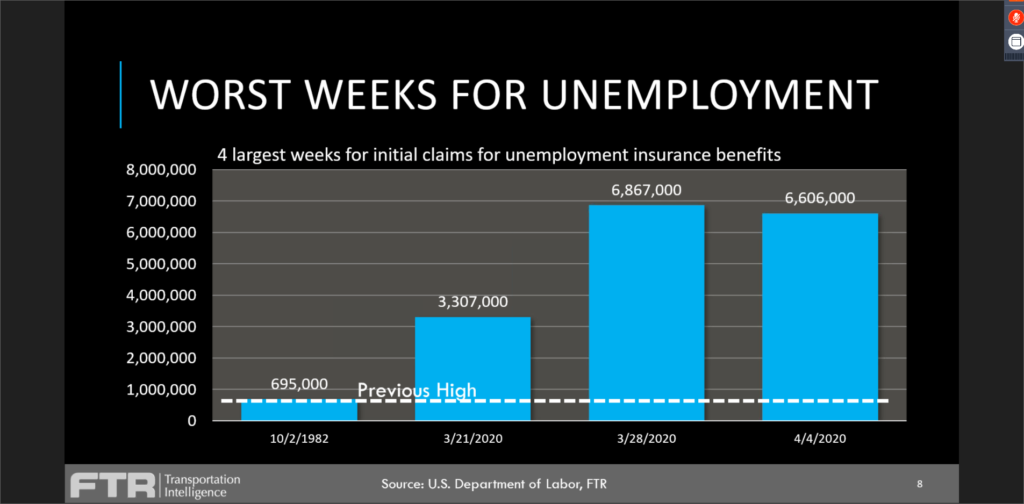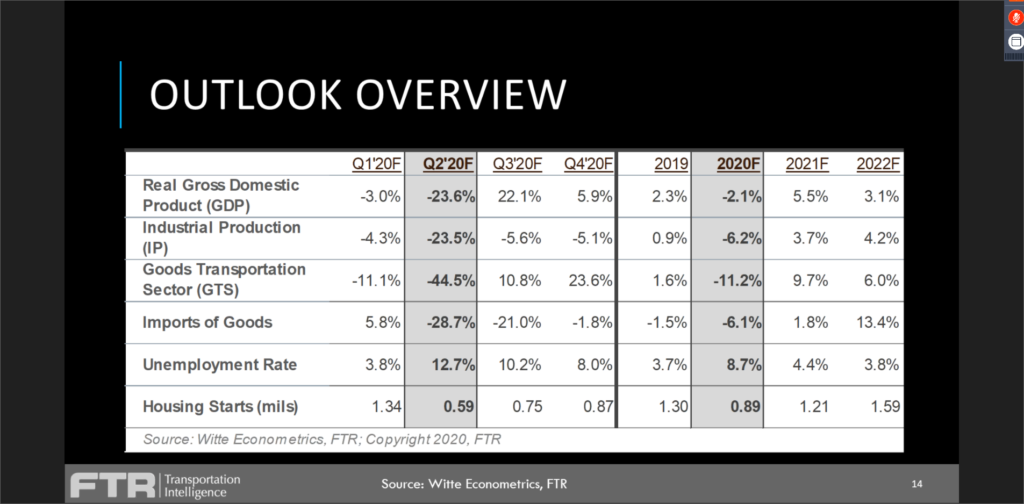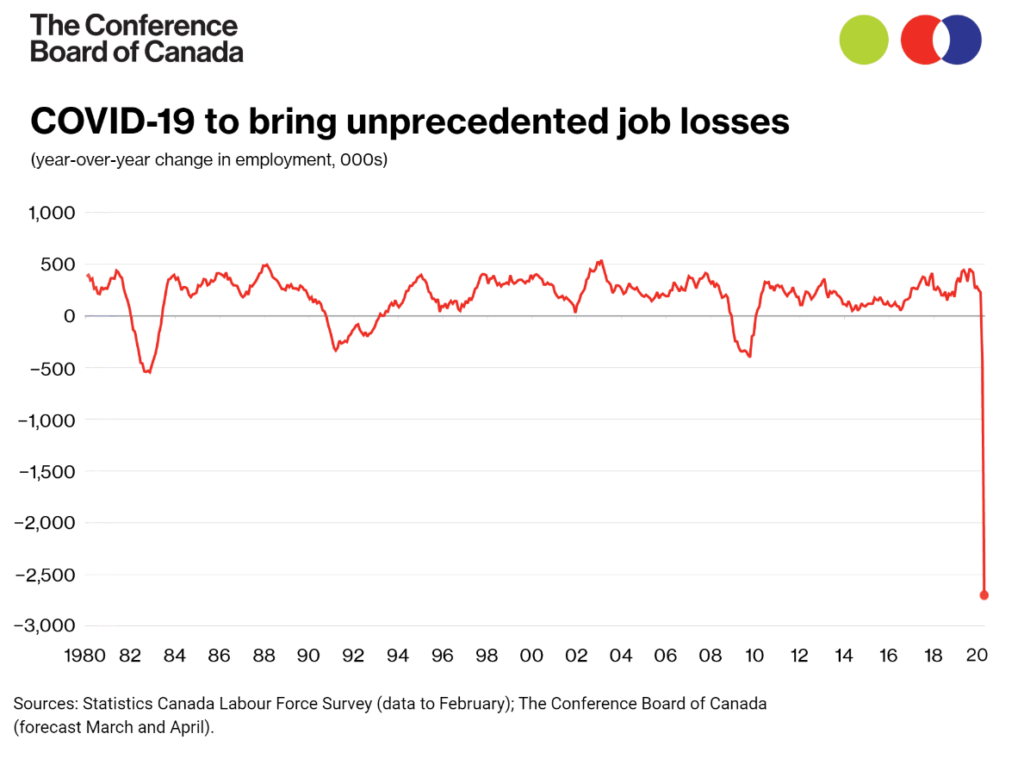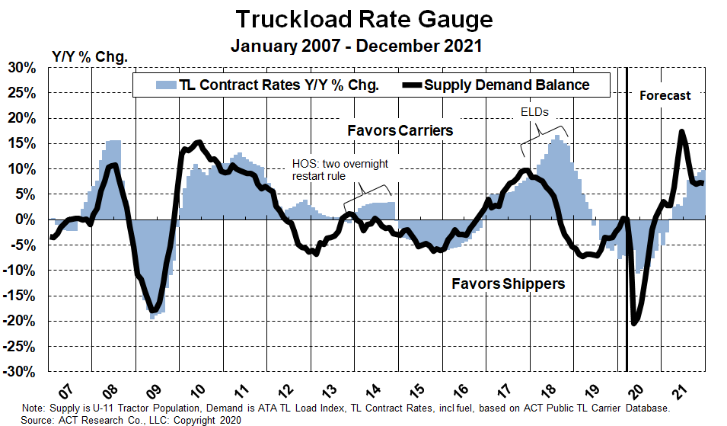Predicting the impact of Covid-19 on trucking
TORONTO, Ont. – Staggering job losses. Evaporating freight demand. And much of the global economy ground to a halt. Those are some of the headlines keeping fleet executives up at night and wondering what the short- and long-term future holds, as the world struggles to contain the Covid-19 pandemic.
Baseball legend Yogi Berra was once quoted as saying “It’s tough to make predictions, especially about the future,” and industry forecaster FTR’s chief economist Bill Witte echoed that statement on an April 9 webinar, saying that never has that been truer than it is today.
An unusual recession
The coronavirus-sparked recession is difficult to predict, because it’s unlike any recession that’s occurred in the past, Witte explained.
“I don’t think this is a normal recession recovery situation. It’s not a business cycle event, it’s a completely artificial event,” he said. As such, looking to past recessions for guidance – even the Great Recession of 2008-2009 – is not useful.
FTR breaks the current economic environment into three phases: the shutdown; containment; and the restart. We are now early in the containment stage, and the longer this phase lasts, the slower the recovery will be, Witte predicted.
“If the containment period is short, the restart could be a pretty rapid event,” he added. “We are working on the assumption the restart is going to take place sometime toward the end of this quarter.”

Initial unemployment claims in the U.S. have been off the charts, with about 16.7 million Americans filing for benefits in the last three weeks. “These numbers are really bad,” Witte said, but he gave reason for some glimmer of optimism. The numbers are seasonally adjusted, which inflates them slightly, and there has already been a decrease in “continuing claims,” meaning some of those workers who filed early may already have been called back to work, possibly thanks to U.S. government stimulus spending.
Still, FTR is predicting about 15 million private sector job losses in the second quarter, with unemployment not likely to fully recover until the end of 2021. This translates to an unemployment rate in the U.S. of 12.7% through the second quarter – worse than any quarter at the peak of the Great Recession, and rivaling Great Depression level numbers.
The effect on freight
Soaring unemployment will naturally affect manufacturing output and consumer spending, two key drivers of truck freight. FTR takes GDP, expected to come in at -23.6% in the second quarter, and strips out services while adding back in imports, to more accurately reflect the impact on truck transportation. Once done, the numbers get worse, with FTR forecasting a -44.5% drop in the goods transportation sector in the second quarter.

“We don’t see a noticeable jump until the fourth quarter,” said FTR CEO Eric Starks, adding the trucking industry won’t return to normalized levels until mid- to late-2021. “I think that’s a big deal for us to understand.”
Industrial production is expected to drop 24% in the second quarter, and fall further in Q3 before seeing an uptick in the fourth quarter. Starks said more plant shutdowns can be expected as the virus moves through the U.S. Midwest.
The good news, he said, is that stimulus spending in the U.S. is allowing many businesses to keep employees on payroll and ready to quickly return to work when the virus is contained. But since global economies are grappling with the same challenges, Starks added exports won’t rebound quickly.
Here in Canada
Canada’s unemployment numbers posted April 9 were equally distressing, with more than a million jobs lost in March.

The Conference Board of Canada reacted, commenting: “In the first wave of Covid-19 related job losses, Canada lost over one million jobs in March. This was the largest monthly employment decline ever and we expect even more job losses in April as the full impact of mandatory closures and physical distancing measures are reflected in the data. The initial job losses were concentrated in accommodations, food service, retail trade and cultural industries. April is likely to show a broader decline as more businesses scale back due to mandatory closures and reduced demand.”
To put it in perspective, Canada shed just 426,500 jobs between November 2008 and June 2009, at the peak of the Great Recession. The Conference Board of Canada also pointed out the most recent job loss data reflects numbers only up to March 21, meaning many more job losses will be seen in April data.
“We expect April’s job losses to be significantly higher than those of March,” the organization warned.
The impact on rates
In its U.S. Rate and Volume Outlook report, ACT Research lowered its rate forecast, warning a “cliff event” has arrived and that spot market rates will drop more than 20% from March levels through April and May.

“The pandemic has caused breakdowns in the economy not seen before in our lifetimes,” said Tim Denoyer, ACT Research’s vice-president and senior analyst. “Freight has adapted to past ‘new normals’ and emerged steady on a per capita basis, and likely will again, eventually, but there are some extraordinary swings coming in the next 12-18 months.”
However, he offered a glimmer of hope for the longsighted.
“Perhaps most interesting from our standpoint is the supply-side effects, as lower demand for new equipment and downtime at the manufacturers will reduce capacity significantly over the coming year, setting up a potential capacity crunch when demand recovers,” Denoyer said.
Have your say
This is a moderated forum. Comments will no longer be published unless they are accompanied by a first and last name and a verifiable email address. (Today's Trucking will not publish or share the email address.) Profane language and content deemed to be libelous, racist, or threatening in nature will not be published under any circumstances.